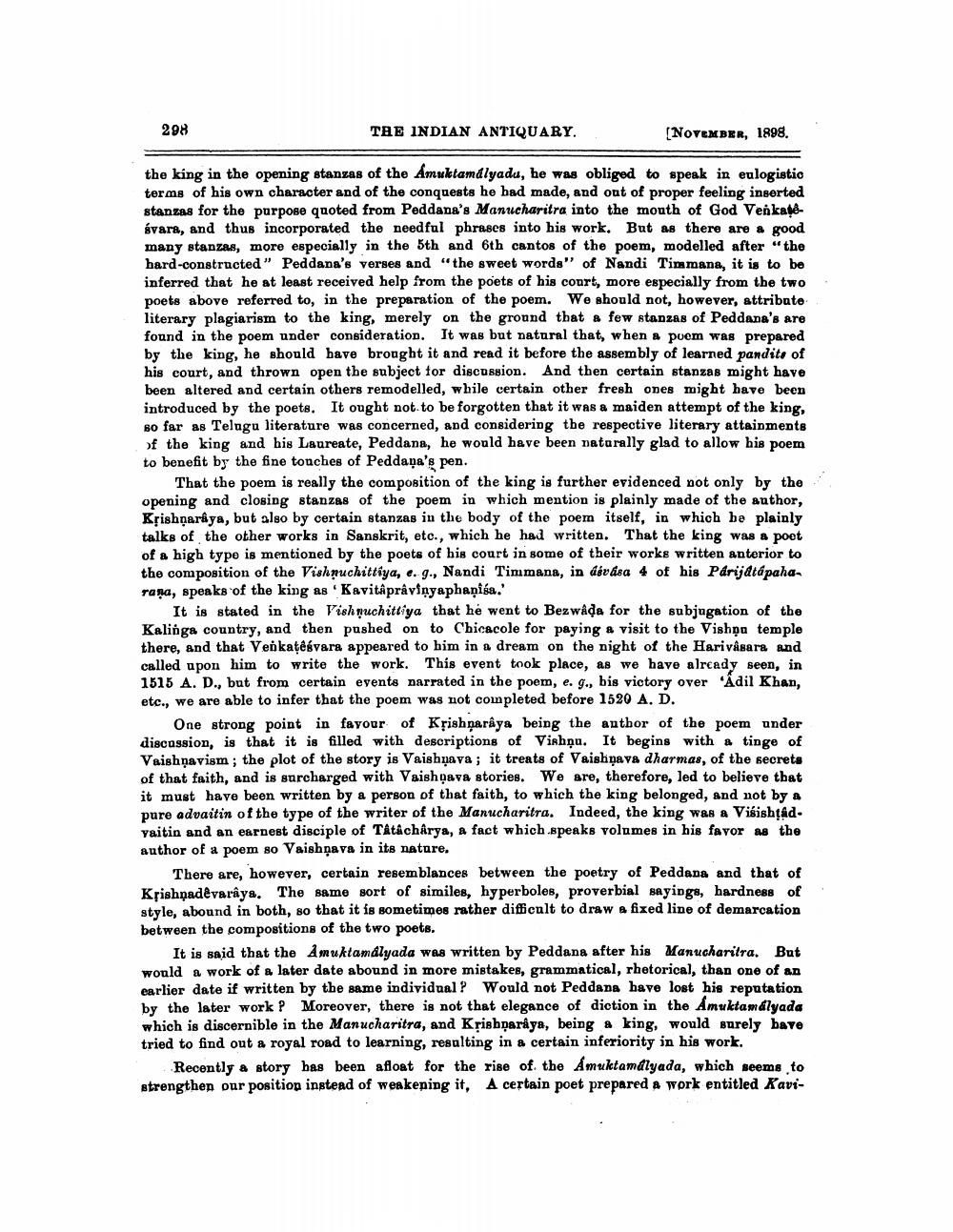________________
298
TAE INDIAN ANTIQUARY.
(NOVEMBER, 1898.
.
the king in the opening stanzas of the Amuktamdlyadu, he was obliged to speak in eulogistic terms of his own character and of the conquests he had made, and out of proper feeling inserted stanzas for the purpose quoted from Peddana's Manucharitra into the mouth of God Venkatesvara, and thus incorporated the needful phrases into his work. But as there are a good many stanzas, more especially in the 5th and 6th cantos of the poem, modelled after "the hard-constructed" Peddana's verses and "the sweet words" of Nandi Tinmana, it is to be inferred that he at least received help from the poets of his court, more especially from the two poets above referred to, in the preparation of the poem. We should not, however, attribute literary plagiarism to the king, merely on the ground that a few stanzas of Peddana's are found in the poem under consideration. It was but natural that, when a poem was prepared by the king, he should have brought it and read it before the assembly of learned pandite of his court, and thrown open the subject for discussion. And then certain stanzas might have been altered and certain others remodelled, while certain other fresh ones might have been introduced by the poets. It ought not to be forgotten that it was a maiden attempt of the king, so far as Telugu literature was concerned, and considering the respective literary attainments of the king and his Laureate, Peddana, he would have been natarally glad to allow his poem to benefit by the fine touches of Peddaşa's pen.
That the poem is really the composition of the king is further evidenced not only by the opening and closing stanzas of the poem in which mention is plainly made of the author, Krishnaraya, but also by certain stanzas in the body of the poem itself, in which be plainly talks of the other works in Sanskrit, etc., which he had written. That the king was a poot of a high type is mentioned by the poets of his court in some of their works written anterior to the composition of the Vishnuchittiya, e.g., Nandi Timmana, in døv asa 4 of his Parijdtápaharana, speaks of the king as KavitApråvinyaphaniga.'
It is stated in the Vishwuchittiya that he went to Bezwada for the subjugation of the Kalinga country, and then pashed on to Chicacole for paying a visit to the Vishọa temple there, and that Veókateśvara appeared to him in a dream on the night of the Harivasara and called upon him to write the work. This event took place, as we have already seen, in 1515 A. D., but from certain events narrated in the poem, e. g., bís victory over 'Adil Khan, etc., we are able to infer that the poem was not completed before 1520 A. D.
One strong point in favour of Krishnaraya being the author of the poem ander discussion, is that it is filled with descriptions of Virhộa. It begins with a tinge of Vaishnavism; the plot of the story is Vaishṇava; it treats of Vaishṇava dharmas, of the secrets of that faith, and is surcharged with Vaishọava stories. We are, therefore, led to believe that it must have been written by a person of that faith, to which the king belonged, and not by a pure advaitin of the type of the writer of the Manucharitra. Indeed, the king was a Visishtad. Yaitin and an earnest disciple of Tâtâchárya, a fact which.speaks volumes in his favor as the author of a poem so Vaishnava in its nature.
There are, however, certain resemblances between the poetry of Peddana and that of Krishṇadêvarêya. The same sort of similes, hyperboles, proverbial sayings, hardness of style, abound in both, so that it is sometimes rather difficult to draw a fixed line of demarcation between the compositions of the two poets.
It is said that the Amuktamalyada was written by Peddana after his Manucharitra. But would a work of a later date abound in more mistakes, grammatical, rhetorical, than one of an earlier date if written by the same individual? Would not Peddana have lost his reputation by the later work P. Moreover, there is not that elegance of diction in the Amuktamdlyada which is discernible in the Manucharitra, and Krishnaraya, being a king, would surely bave tried to find out a royal road to learning, resulting in a certain inferiority in his work.
Recently a story has been afloat for the rise of the Amuktamdlyada, which seems to strengthen our position instead of weakening it, A certain poet prepared a work entitled Kavi




